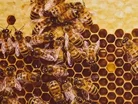Tech firm BestBees helps honey bees with remote monitoring

The global honey industry was worth an estimated $9.2b in 2020. Out of the 100 crop species which feed 90% of the world's population, 70 of them are pollinated by bees. In addition, 1.4b farming jobs, depend on the pollination of crops carried out by bees.
Bees are vitally important to planet earth and everyone on it - but they are in danger. Between April 2019 and 2020, 43% of US hives were lost. Bee hives have been devastated by:
- Parasites
- Pesticides
- Climate change
Tech firms have taken on one of the world’s oldest occupations, beekeeping, in order to maintain the welfare of the the mighty bumblebee.
Best Bees Company bumbles forward
US business, Best Bees Company, was shocked at the plight of the American bee colonies.
Best Bees install hives and then use an advanced software system to monitor and record the health of each bee hive.
"We are looking at why thriving beehives live", said Wilson-Rich, chief scientific officer at Best Bees. "We need to understand why they're doing better. With that research data we can get wonderful benefits... it is telling us how the bees are actually doing."
Best Bees also harvests and bottles the honey for the property owners, of where the hives sit, to enjoy.
The data is being shared with Harvard University and Massachusetts Institute of Technology, where researchers are trying to understand and assist the bees in their duty.
Tech saves beekeepers time and labour
The Irish business ApisProtect is also utilising technology to help the bees, through their wireless in-hive sensors, which transmit data.
"We collect temperature, humidity, sound and acceleration [of the bees flying out of the hive] data," said Fiona Edwards Murphy, chief executive "What we do is extract those raw data points and then use machine learning to convert that into useful information. We tell the beekeeper, for example, which hives are growing and which hives are shrinking, or which hives are alive and which hives are dead."
The technology means beekeepers no longer have to manually inspect hives, which saves time and effort and allows the bees to go about their business uninterrupted.
"In a commercial operation only about 20% of hives at any given time need intervention," concludes Edwards Murphy. "The problem is that beekeepers don't know which 20%. They literally go out and pick around a hive to see if it's the one they should be looking at. What we do is enable them to get a picture of what's happening in all their hives, spread across a large area, before they even leave their office in the morning. For commercial beekeepers, we see a 50% reduction in labour costs. That obviously has a huge impact on the business of beekeeping."



